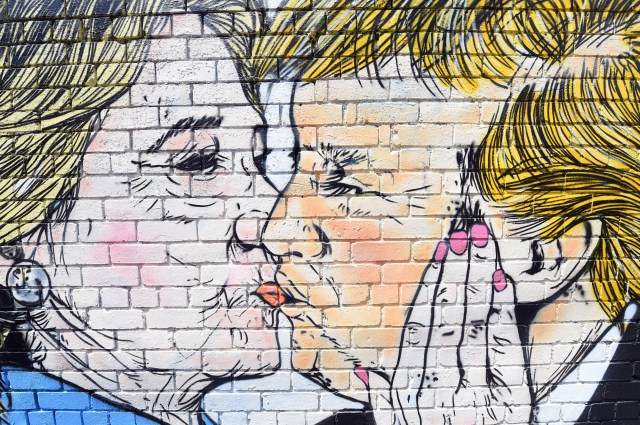Donald Trump and Hillary Clinton by artist Lushsux. Credit: AAP Image / Julian Smith

Here’s an interesting word: kakistocracy. It means rule by the worst people.
You might think that politics right now is showing some distinctly kakistocratic tendencies. According to George Hawley in the American Conservative, this is not a figment of your imagination – it’s a function of the increased polarisation of our political culture.
There’s nothing inherently wrong with polarised politics. If, as a society, we face important either/or questions – and people genuinely disagree over which way to go – then why shouldn’t politics be polarised? The debate might be heated and the outcome a big disappointment for the losing side, but as long everyone has their say, and the voting is free and fair, well, that’s democracy. A politics of big differences might even attract politicians with the passion to fight for what they believe in and the humanity to heal divisions after the issues at stake have been settled.
However, Hawley’s argument is that the increased polarisation we’re seeing (in America) isn’t really about issues or ideology:
“The Bible-thumping, pro-war, free-market purist is a rare creature. So is the gun-grabbing, abortion-loving, socialist atheist. Perfect conservative and liberal stereotypes are hard to find in the real world.
“Especially on economic issues, Americans exhibit a remarkable consensus, for better or for worse. Across the partisan divide, most people endorse a form of welfare capitalism—we just disagree on the minutia of tax policy, regulation, and the strength of the social safety net.”
So, if deeper disagreement on policy isn’t what’s driving Democrats and Republicans apart, what is?
“Eric Groenendyk of the University of Memphis may have found a solution to this puzzle. In a recent article, Groenendyk offers a new explanation for how partisans’ antipathy toward the opposing party can coexist with growing frustration towards their own…”
“Because party identification is an important part of personal identity, we want to be good and loyal partisans and we feel good when our team wins. On the other hand, we like to imagine ourselves as rational beings, forming political opinions and loyalties according to our analysis of what is happening in the world.”
The trouble comes when our chosen side lets us down and messes-up over and over again. Staying loyal to a clown show is psychologically stressful – and stress needs a release:
“According to Groenendyk, we can resolve the tension between our party identifications and our frustration with our parties by increasing our antipathy toward our parties’ opponents. In other words, we can justify our vote choice if we believe the opposing party is worse…
“…the more exasperated we become with our parties, the more we demonize the other side.”
That’s all rather depressing, but here’s the kicker:
“According to Groenendyk: ‘If partisans’ identities are increasingly anchored to hatred of the outparty than affection for their inparty, electoral dynamics are likely much more fluid than many accounts suggest. Thus, insurgent candidates with questionable ideological credentials (e.g., Donald Trump) may be more appealing than one might expect in the age of ideologically sorted parties.’”
Of course, an insurgent candidate could be just what’s needed – a breath of fresh air with the new ideas to save the inparty from being so useless. Then again, why bother with the hard work of genuine reform, when you could base your insurgency on going further, and lower, than anyone else in bashing the outparty? For instance, don’t offer a reasoned critique of your opponent’s policies, get your supporters to call for her imprisonment.
Picking an insurgent as leader may well help the inparty motivate its troops at election time. But if it wins, the chances of running a competent administration are correspondingly reduced. Therefore, we can expect another round of disappointment and a further jolt of compensatory polarisation for the next kakistocrat to exploit.










Join the discussion
Join like minded readers that support our journalism by becoming a paid subscriber
To join the discussion in the comments, become a paid subscriber.
Join like minded readers that support our journalism, read unlimited articles and enjoy other subscriber-only benefits.
Subscribe